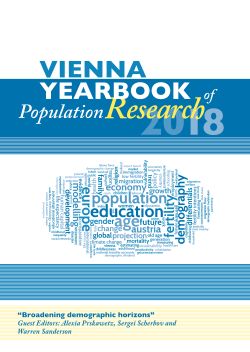 |
 |
Vienna Institute of Demography (Ed.)
Vienna Yearbook of Population Research 2018
Broadening demographic horizons
Marc Luy,
Bernhard Köppen
S. 235 - 257 doi: 10.1553/populationyearbook2018s235
Verlag der Österreichischen Akademie der Wissenschaften doi: 10.1553/populationyearbook2018s235
Abstract:
The theory of the “(first) demographic transition” (DT) still has considerable practical relevance in the field of population research. For instance, the DT serves as a conceptual model that underlies the UN’s population projections, and is central to the discussion around the so-called “demographic dividend”. Although it was first described 90 years ago, several questions related to the DT remain open or need verification. In particular, there is debate about the question of what the indispensable triggers of the DT are. Assumptions regarding the primary causes include increased education for women and related changes in values, as well as economic development, urbanisation, migration, and the democratisation process. This paper aims to contribute to DT-related research using an innovative research approach. Our study covers all 102 countries with populations that have undergone the DT between 1950 and 2010. Among these countries, we identified 25 populations that passed through this process at an exceptionally high tempo. We refer to this process as “express transitioning” (ET), and seek to identify its main determinants by comparing the ET populations with the populations of the other DT countries. The data we use are taken from theWittgenstein Centre Data Explorer, the UN World Population Prospects, the UN World Urbanization Prospects, the World Bank Group, and the Center for Systematic Peace. Our analysis is based on rather descriptive methods, including ANOVA tests and bivariate correlations.We find that the urbanisation level and the education dynamics are most closely associated with ET, whereas other variables show no significant association with the ET process.
2018/12/20 07:11:03 Object Identifier:
0xc1aa5576 0x003a2759
Rights:All rights reserved.For questions regarding copyright and copies please contact us by email.
Introduction
Broadening Demographic Horizons: Demographic Studies Beyond Age and Gender
Alexia Prskawetz, Warren Sanderson, Sergei Scherbov
Demographic Debate
Are there principles of demography? A search for unifying (and hegemonic) Themes
William P. Butz
Can Taylor's law of fluctuation scaling and its relatives help select more plausible multi-regional population forecasts?
Joel E. Cohen, Helge Brunborg, Meng Xu
Probabilistic demographic forecasts
Nico Keilman
Education and demography: a review of world population and human capital in the 21st century
Philip Rees
Research Articles
Population dynamics and human capital in Muslim countries
Mohammad Jalal Abbasi-Shavazi, Gavin W. Jones
Survival inequalities and redistribution in the Italian pension system
Graziella Caselli, Rosa Maria Lipsi
Does education matter? – economic dependency ratios by education
Alexia Prskawetz, Bernhard Hammer
Multistate projections of Australia’s Indigenous population: interacting area group and identification status change
James Raymer, Yanlin Shi, James O'Donnell, Nicholas Biddle
The end of population ageing in the more developed world
Warren Sanderson, Sergei Scherbov, Patrick Gerland
From intentions to births: paths of realization in a multi-dimensional life course
Maria Rita Testa, Francesco Rampazzo
Towards causal forecasting of international migration
Frans Willekens
Data and Trends
Summary of Demographic and human capital scenarios for the 21st century: 2018 assessment for 201 countries
Nicholas Gailey, Wolfgang Lutz
"Express transitioning" as a special case of the demographic transition
Marc Luy, Bernhard Köppen
|




 Home
Home Print
Print
 References
References
 Share
Share
